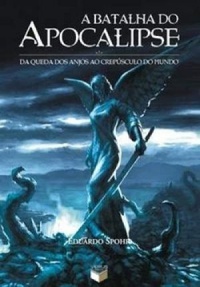Today I bring you an author that is neither dead or has been translated into English (or any other language other than Portuguese). But they (him and his publisher) are trying to sell the rights for international versions, so you people can poke publishers wherever you are, if you like the story ;)
Also, that means all names and quotes are translated by me and might be different when the book gets oficially translated.
This is my review, originally published on Sobre Livros.
I'm very proud - and aprehensive - to talk to you today about a book I've been following for a long time and am extremelly happy and proud to say is a brazilian one.
The Battle of the Apocalypse is a fiction book, that talks about the last days of Earth, before the Apocalypse. I'm not overreacting when I say that the situation sounds very real, which kind of scares a bit...
 The book follows the footsteps of Ablon, a renegade angel, expelled from Heaven for rising against Michael, the Prince of Angels, that wants the destructions of humans, for considering them inferiors and naturally evil - his are the orders for "The Flood" and the destruction of Sodom and Gomorrah.
The book follows the footsteps of Ablon, a renegade angel, expelled from Heaven for rising against Michael, the Prince of Angels, that wants the destructions of humans, for considering them inferiors and naturally evil - his are the orders for "The Flood" and the destruction of Sodom and Gomorrah.But where is God, you ask me? God is asleep. Each day of the creation took several thousands of years and we would still be on the Seventh Day (when God rested), actually, the Seventh Day started waaaaay back, when men came out of the caves and the whole Bible is just a parable for the whole evolution. Also, on every part where God is mentioned in human history, it was the angels who were speaking on His behalf.
The Battle of the Apocalype takes us not only to the end, the Apocalypse, but also to a journey through the human history, that Ablon witnessed closely, for being stuck to Earth (or Haled, as the angels call it), from ancient Babylon and the fall of Babel's Tower, going through China and Ancient Rome, to the castles of England and the fall of Constantinopla, we see the world history on the eyes of an immortal being, who can truly see what men are doing and some of the actual reasons for these actions.
Personally, I think it's amazing a book like this by a brazilian author. Really! Despite it all, I do have some prejudice against any historical romance that's not from Great Britain. It's one of my "things" - despite loving historical romances, all the good ones I've read where from there - until now.
Of course to every hero, there must be a bad guy and, in this story, since the start we see 2 major villains: Apollyon and "the Dark Angel" whose real identity is only revealed on the final pages of the book. Apollyon, though, is Ablon's enemy since "forever". They were rival generals on the same order, who faced a duel (theoretically friendly) and only didn't kill each other because they were stopped by a superior - and that fight was still waiting to be ended, despite Apollyon being sent to hell and Ablon being stuck to Earth.
Actually, we have villains for all tastes and sizes! Lucifer, of course, Michael, the tyrant Prince of Angels, Apollyon, the Dark Angel, not to mention smaller villains from the historical parts, Nimrod, Mai Yun and the other 2 god spirits, Zamir, and the several angels that try to kill Ablon along the book - and there are several of them.
The story is catchy, surprising and passionate. The characters are very well developed, no part could be cut off, because each little piece contributes to the learning that Ablon is going to need by the end and that's the only way we can understand each of his decisions, each action along the history will take him to the end, that's as surprising as it is philosophical.
I hope you really felt the excitement I was trying to translate to you, also, I invite you to follow or talk to the author on Twitter (@eduardospohr), he's really nice and open ;)



